Using REGEX in Google Search Console is kind of like having keyword-research superpowers.
Find keywords your website is ALREADY visible for, and then do something with them.
Quick Navigation
How to Use REGEX in Google Search Console for Keyword Research
Here’s how to find these amazing keywords in Google Search Console using a simple REGEX filter:
- Open GSC
- Go to Search Results
- Add a Filter (select “+ New”)
- Select “Query”
- Select “regex”
- Enter: (?i)^(who|what|where|when|why|how)
You can add additional words, like “can”, “does”, etc

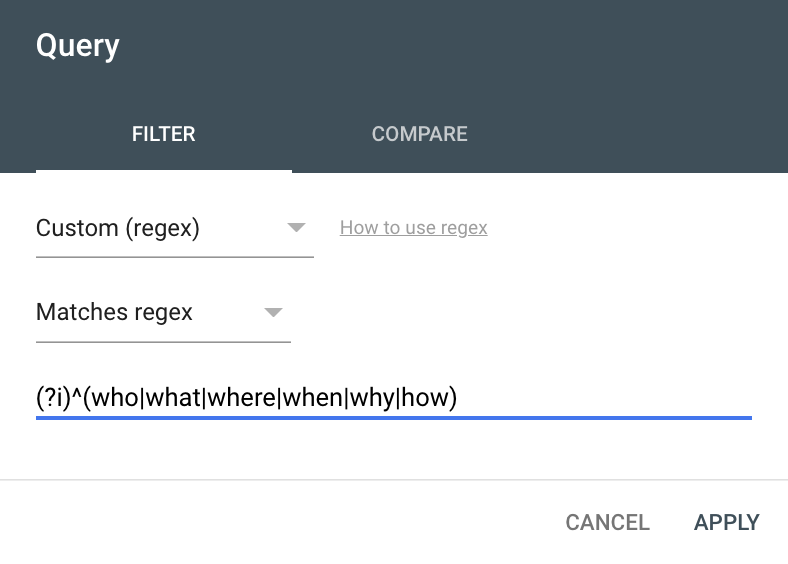
You will now see the questions (keywords) that your site is getting Impressions and Clicks for.
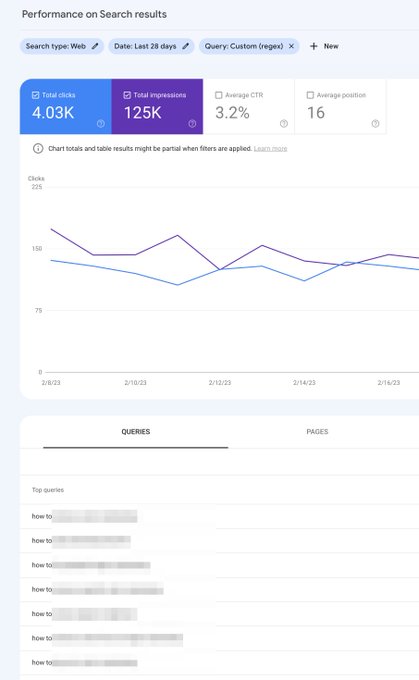
At this point, I download the data. Personally, I move it to a Google Sheet, so I can easily share it with a teammember down the road.
If you have a lot of these, you might want to get API access to download all of them.
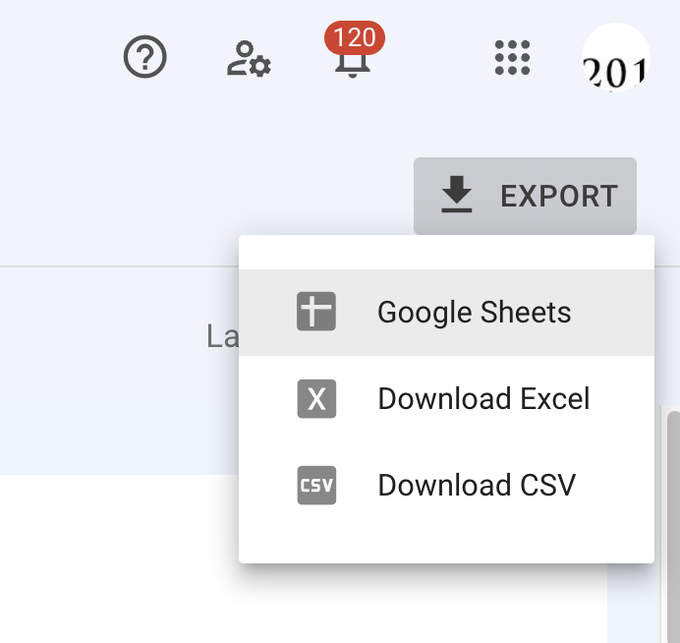
If your website is getting decent traffic, you’ll have A LOT of keywords.
How to Filter Keywords Found Using REGEX
I set up a filter to isolate really low CTR keywords. Why?
IF the article has High Impressions but Low Clicks, that typically means I should add the content to the existing article (not always).
Remember you’re working with percentages, so set your number accordingly in your filter.
In this example, I use the number 0.005, which is everything below a 0.5% CTR.
You can use whatever CTR % makes sense for your site and your goals.
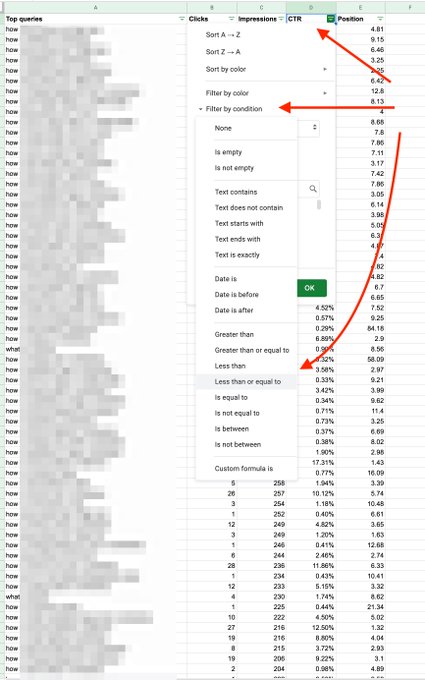
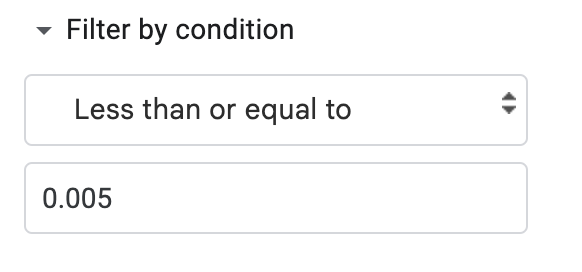
Boom! That is a much more manageable list.
Find the article each of these keywords corresponds to, and go add content about the topic.
Quite often, I realize I haven’t even addressed the topic!
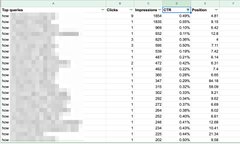
Let’s look at some specific examples.
How to Update Content with Google Search Console Keywords
Scenario One
Let’s pick that top article on the spreadsheet. This is an article that currently gets 2,615 Impressions over the past 30 days, but 0 clicks. When you look at the Average Position, the post sits at spot 42.2 in the ranking. That’s why it isn’t getting any clicks!
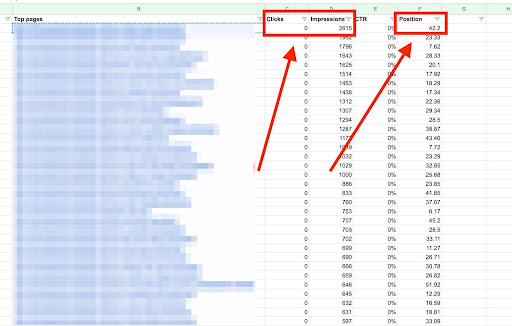
When I put the same URL into Ahrefs, I see a similar story. This article ranks for 139 keywords, but the vast majority of keywords rank on pages 3 and 4. I won’t get any clicks from those rankings.
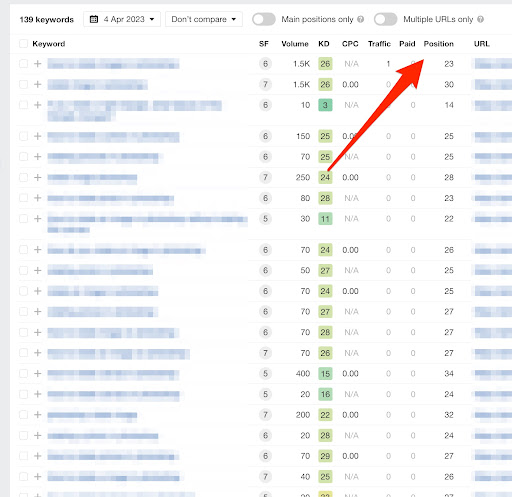
Going back to Google Search Console, I can isolate this exact page to learn more. Just hit “+New” and add the specific page URL.

Looking at the Queries tab, I can see exactly which keywords are getting Impressions but no Clicks.
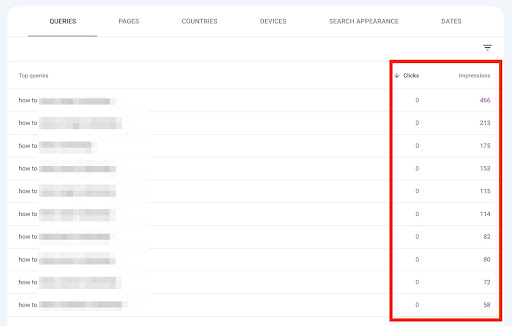
Now is a good time to open up the specific URL. Start copying the different queries that are listed, and search for them on your page.
Make sure to use your brain here. For example, one of the queries listed in GSC might be “how to cut your pineapple”, and you might have used the keyword “how to cut a pineapple” 5 times. Same same.
But, if one of the keywords you see is “how to slice a pineapple”, and you don’t use the word “slice at all”, now that’s different.
Even better, you might be missing entire topics. For example:
- how to cut a pineapple without waste
- how to cut a pineapple rings
- how to cut a pineapple with a pineapple cutter
- how to cut a pineapple into chunks
You might have written an article about how to cut pineapple, but left off key topics like these.
There you go! Go back to your article and work these queries in as new paragraphs (H3 + content, as an example).
Scenario Two
Let’s take a different example URL. What about that one that gets 0 clicks, but sits in an Average Position of 7.62.
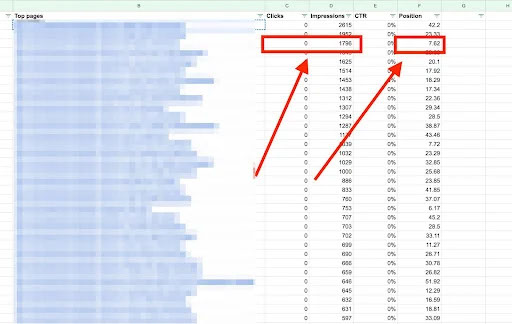
I put the URL into Ahrefs, and I can see that most of the “good” keywords are ranking just outside of the Top 10.
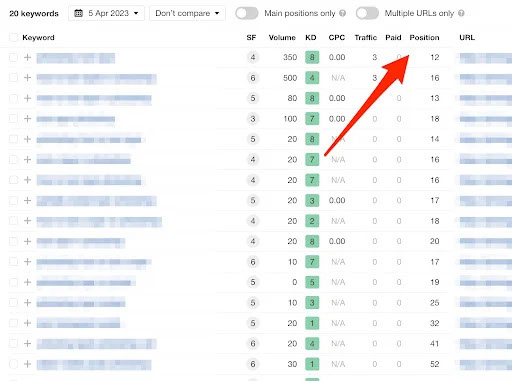
I open up the URL and start plugging in the queries into a search, but I find that each of them is used. There aren’t any real content gaps.
Next, I will typically check a few things:
- When was this article published?
- When was this article last updated?
- How many backlinks does this article have?
- How many backlinks do the top 3 ranking articles have?
- How many internal links does this article have?
Let’s look at these questions for this article:
- When was this article published? June 14, 2021. It has certainly had plenty of time to age and pick up rankings.
- When was this article last updated? Never. Ack, that’s not great.
- How many backlinks does this article have? 0. Not the end of the world, unless the top ranking articles have backlinks.
- How many backlinks do the top 3 ranking articles have? 3, 71, and 5. You could argue about how many the top 3 need to have, but certainly at least 3-5 backlinks.
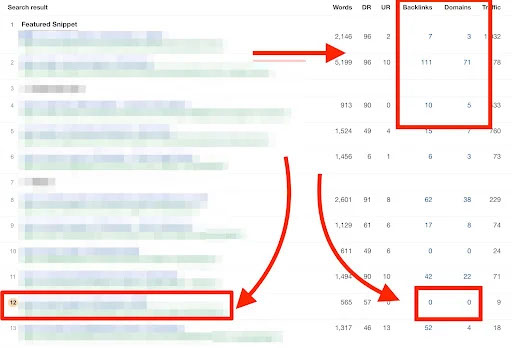
- How many internal links does this article have? Technically 1, but it’s from the 3rd page of a category. So, in reality, none!

So now I know what I need to do! Here’s what I would do next:
- Update the article by refreshing some of the content, adding unique imagery, maybe a few FAQs
- Build a backlink
- Add 3-5 internal links with Link Whisper
Then I’ll check back in 1-2 months. Depending on where the article is at, rinse and repeat!
Wrapping Up
Regex is a powerful search tool in Google Search Console, but only if you know how to use the data to improve your website. I hope these practical examples will help!
Let me know if they helped or if you have any questions.
If you need any help with your specific website, remember that we offer Custom Website Reviews. Or, if you’re having a specific problem you need help with, we Consult for Website Owners!

